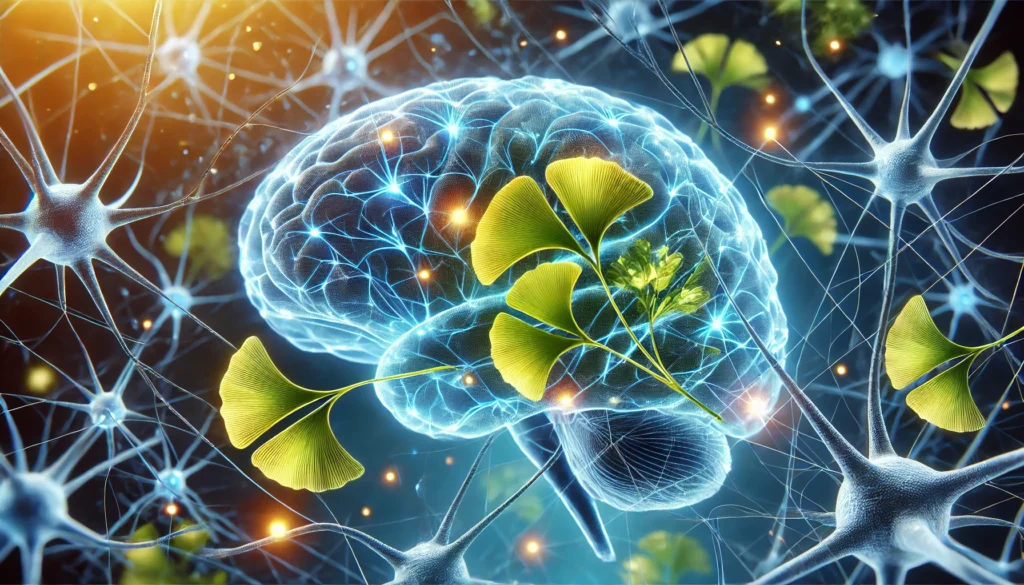Ginkgo biloba, an ancient plant with a lineage stretching back over 270 million years, has garnered significant attention in recent years for its purported health benefits, particularly in the realm of cognitive enhancement and dementia management. The allure of ginkgo biloba lies in its potential to serve as a natural remedy for Alzheimer’s disease, a condition that continues to challenge modern medicine. In this article, we delve into the scientific underpinnings of ginkgo biloba’s role in Alzheimer’s, examining its historical use, current research, and future implications.
You may also like: Tips to Improve Low Average Memory Performance
A Historical Perspective on Ginkgo Biloba
Ginkgo biloba, often referred to as a living fossil, has been used in traditional Chinese medicine for centuries. Its leaves and seeds have been employed to treat a variety of ailments, ranging from respiratory issues to circulatory disorders. The longevity and resilience of the ginkgo tree have made it a symbol of endurance and vitality. However, it is the plant’s potential impact on brain health that has catapulted it into the spotlight in recent years.
Traditional Uses and Cultural Significance
In ancient Chinese culture, ginkgo biloba was revered not only for its medicinal properties but also as a symbol of longevity and hope. Its seeds, known as “Bai Guo,” were used in various traditional remedies to treat lung ailments and improve circulation. The resilience of the ginkgo tree, which can live for over a thousand years, has made it a cultural icon, often planted in temple gardens and sacred spaces.
Ginkgo in Western Medicine
Ginkgo biloba made its way into Western medicine in the late 20th century as researchers began to investigate its potential cognitive benefits. The Western world became interested in its use after studies suggested it could enhance memory and cognitive function. This transition from traditional use to scientific investigation marked a significant shift in the perception of ginkgo biloba, from a cultural and historical relic to a subject of modern scientific inquiry.
The Symbolism of Resilience
The ginkgo tree’s ability to survive in harsh environments, including the atomic bombing of Hiroshima, has further solidified its status as a symbol of resilience. This symbolism is often extended to its potential health benefits, particularly in the context of neurodegenerative diseases like Alzheimer’s. As a living testament to endurance, the ginkgo tree inspires hope in the ongoing battle against cognitive decline.
The Science Behind Ginkgo Biloba and Cognitive Health
Mechanisms of Action
The scientific community has been intrigued by ginkgo biloba’s potential effects on cognitive health, particularly in relation to Alzheimer’s disease. The active compounds in ginkgo biloba, primarily flavonoids and terpenoids, are believed to possess antioxidant and anti-inflammatory properties. These compounds may protect neurons from oxidative stress and reduce inflammation, both of which are implicated in the pathogenesis of Alzheimer’s disease.
Antioxidant Properties
The flavonoids in ginkgo biloba are powerful antioxidants that neutralize free radicals, which are unstable molecules that can damage cells. By reducing oxidative stress, ginkgo biloba may help preserve neuronal integrity and function. This antioxidant action is particularly crucial in the brain, where oxidative damage is a significant factor in cognitive decline.

Anti-inflammatory Effects
Terpenoids, another group of active compounds in ginkgo biloba, are known for their anti-inflammatory properties. Chronic inflammation in the brain is a hallmark of Alzheimer’s disease and contributes to the progression of cognitive impairment. By mitigating inflammation, ginkgo biloba may help slow down or prevent the deterioration of cognitive functions.
Neuroprotection and Blood Flow
Ginkgo biloba is also thought to improve cerebral blood flow, enhancing the delivery of oxygen and nutrients to the brain. This increased circulation may provide neuroprotective effects, supporting brain health and potentially improving symptoms of cognitive disorders. Enhanced blood flow can facilitate the removal of metabolic waste, further contributing to neuronal health.
Research on Ginkgo Biloba and Alzheimer’s
Numerous studies have explored the relationship between ginkgo biloba and cognitive function, with mixed results. Some research suggests that ginkgo biloba may improve cognitive performance in individuals with mild cognitive impairment or early-stage Alzheimer’s disease. For instance, a study published in the Journal of the American Medical Association found that ginkgo biloba extract may modestly improve cognitive function in patients with dementia.
Positive Findings and Clinical Trials
Several clinical trials have reported that ginkgo biloba can lead to improvements in attention, memory, and other cognitive functions in individuals with Alzheimer’s. These studies highlight its potential as a complementary therapy for slowing cognitive decline. The results have been particularly promising for those in the early stages of the disease, where intervention can make a more significant impact.
Contradictory Results and Challenges
Despite positive findings, other studies have not shown significant benefits, leading to debates within the scientific community. Factors such as variations in study design, dosage, and participant characteristics may contribute to these discrepancies. The challenge lies in standardizing research methodologies to obtain more consistent results.
Understanding Variability in Research
The inconsistency in research outcomes may also be attributed to the complexity of Alzheimer’s disease itself. The heterogeneity of the disease, influenced by genetic, environmental, and lifestyle factors, can affect how individuals respond to treatments like ginkgo biloba. Understanding these variables is crucial for refining research approaches and developing personalized treatment strategies.
Current Trends in Ginkgo Biloba Usage
As interest in natural and alternative therapies grows, ginkgo biloba has gained popularity as a dietary supplement for cognitive enhancement. Health and wellness enthusiasts, biohackers, and even some healthcare professionals advocate for its use as part of a holistic approach to brain health. The supplement is widely available in various forms, including capsules, tablets, and liquid extracts, making it accessible to the general public.
Popularity Among Health Enthusiasts
Ginkgo biloba has become a staple in the wellness community, often marketed as a natural brain booster. Its appeal lies in the desire for non-pharmaceutical solutions to enhance mental clarity and focus. Many consumers are drawn to ginkgo biloba for its reputation as a safe, plant-based supplement that can fit seamlessly into a healthy lifestyle.
Integration into Wellness Routines
Beyond standalone supplementation, ginkgo biloba is frequently integrated into broader wellness regimens. Individuals focused on cognitive health may pair it with other practices such as mindfulness, meditation, and exercise. This integration reflects a growing trend towards comprehensive approaches to health, recognizing the interconnectedness of physical, mental, and emotional well-being.
Market Availability and Consumer Awareness
The widespread availability of ginkgo biloba supplements in health stores and online platforms has made it a convenient option for consumers. However, with this accessibility comes the need for consumer education regarding quality and efficacy. As interest in ginkgo biloba grows, so does the importance of understanding how to choose reputable products and navigate marketing claims.
Safety and Dosage Considerations
While ginkgo biloba is generally considered safe for most people, it is not without potential side effects. Some individuals may experience gastrointestinal discomfort, headaches, or allergic reactions. Additionally, ginkgo biloba can interact with certain medications, such as blood thinners, and should be used with caution in individuals with specific health conditions. As with any supplement, it is crucial to consult a healthcare professional before incorporating ginkgo biloba into one’s regimen.
Potential Side Effects
Although generally well-tolerated, ginkgo biloba can cause mild side effects in some individuals. Gastrointestinal issues, headaches, and dizziness are among the most commonly reported symptoms. Awareness of these potential reactions is essential for those considering ginkgo biloba, ensuring they can make informed decisions about its use.
Drug Interactions and Precautions
Ginkgo biloba’s interaction with blood thinners and other medications is a critical consideration for users. The herb can enhance the effects of anticoagulants, increasing the risk of bleeding. Individuals on medication should seek medical advice before starting ginkgo biloba to avoid adverse interactions.
Guidance for Safe Use
For those new to ginkgo biloba, starting with a low dose and gradually increasing may help minimize side effects. Monitoring the body’s response and adjusting accordingly can lead to a more personalized and effective supplementation experience. Consulting healthcare providers can also provide tailored recommendations based on individual health needs.

Future Implications and Research Directions
The quest to understand and combat Alzheimer’s disease is ongoing, and ginkgo biloba remains a topic of interest for researchers. Future studies may focus on refining our understanding of ginkgo biloba’s mechanisms of action, determining optimal dosages, and identifying specific populations that may benefit most from its use.
Advancements in Mechanistic Understanding
As scientific tools and methodologies advance, researchers have the opportunity to delve deeper into the molecular mechanisms of ginkgo biloba. Understanding how its compounds interact with biological pathways can inform more precise therapeutic applications. This knowledge can lead to the development of targeted interventions that maximize benefits while minimizing risks.
Personalized Medicine and Target Populations
The field of personalized medicine is expanding, with potential applications for ginkgo biloba in Alzheimer’s treatment. Identifying genetic markers and other characteristics that predict positive responses to ginkgo biloba can lead to more tailored approaches. By targeting specific populations, researchers can enhance treatment efficacy and patient outcomes.
Exploring Synergistic Therapies
Another promising avenue is the exploration of synergistic effects between ginkgo biloba and other therapeutic modalities. Combining ginkgo biloba with conventional treatments, other supplements, or lifestyle interventions could offer enhanced benefits. This integrative approach acknowledges the multifaceted nature of Alzheimer’s disease and the need for comprehensive solutions.
Role of Technology in Research
Advancements in neuroimaging and biomarker research may also provide insights into how ginkgo biloba affects brain structure and function, potentially paving the way for more targeted interventions. Moreover, as our knowledge of Alzheimer’s disease evolves, there may be opportunities to explore synergistic effects between ginkgo biloba and other therapeutic modalities.
Neuroimaging and Biomarkers
The use of neuroimaging techniques, such as MRI and PET scans, can help visualize the effects of ginkgo biloba on brain structure and function. These technologies allow researchers to observe changes in brain activity and connectivity, providing valuable data on the herb’s impact. Biomarkers, on the other hand, can offer insights into biochemical changes, further informing research directions.
Integration with Digital Health Tools
Digital health tools, such as mobile apps and wearables, have the potential to enhance research on ginkgo biloba by tracking cognitive changes and lifestyle factors in real-time. These technologies can facilitate large-scale data collection, enabling researchers to analyze patterns and correlations more effectively. The integration of digital health into research can accelerate discoveries and improve personalized treatment strategies.
Data-Driven Insights
With the proliferation of big data and machine learning, researchers can harness these tools to uncover patterns and insights from extensive datasets on ginkgo biloba use. Data-driven approaches can identify trends, optimize dosage recommendations, and predict outcomes, contributing to a more nuanced understanding of its role in Alzheimer’s treatment.
Practical Advice for Incorporating Ginkgo Biloba
For those considering ginkgo biloba as part of their wellness routine, it is essential to approach its use thoughtfully. Here are some practical tips:
Consult a Healthcare Professional
Before starting any new supplement, especially if you have underlying health conditions or are taking medications, seek guidance from a healthcare provider. This step ensures that ginkgo biloba is safe and appropriate for your specific health needs. A healthcare professional can provide personalized advice, taking into account any potential interactions or contraindications.
Choose Quality Products
Opt for supplements from reputable manufacturers that adhere to quality standards and provide clear labeling regarding dosage and ingredients. Verifying third-party testing and certification can offer additional assurance of product quality. Investing in high-quality supplements can maximize benefits and reduce the risk of contaminants or ineffective formulations.
Monitor Effects
Pay attention to how your body responds to ginkgo biloba and adjust your regimen as needed. Keep track of any changes in cognitive function or overall well-being. Maintaining a journal of your experiences can help identify patterns and inform decisions about dosage adjustments. Regular monitoring allows for a responsive approach to supplementation, ensuring optimal outcomes.

Adopt a Holistic Approach
Remember that no supplement can replace a healthy lifestyle. Prioritize a balanced diet, regular exercise, adequate sleep, and stress management to support cognitive health. Ginkgo biloba should be viewed as one component of a comprehensive wellness strategy. Embracing a holistic approach acknowledges the interplay between lifestyle factors and cognitive function, promoting long-term brain health.
In conclusion, while ginkgo biloba holds promise as a natural intervention for Alzheimer’s disease, it is not a panacea. Ongoing research will continue to shed light on its role in cognitive health, offering hope for those seeking alternative approaches to managing this challenging condition. As always, informed decision-making and professional guidance are key to optimizing health and wellness.
Further Reading:
Alzheimer’s disease: Research summaries – Do Ginkgo products help?
Ginkgo Biloba Doesn’t Prevent Dementia
Alzheimer’s Disease and Gingko Biloba
Important Note: The information contained in this article is for general informational purposes only, and should not be construed as health or medical advice, nor is it intended to diagnose, prevent, treat, or cure any disease or health condition. Before embarking on any diet, fitness regimen, or program of nutritional supplementation, it is advisable to consult your healthcare professional in order to determine its safety and probable efficacy in terms of your individual state of health.
Regarding Nutritional Supplements Or Other Non-Prescription Health Products: If any nutritional supplements or other non-prescription health products are mentioned in the foregoing article, any claims or statements made about them have not been evaluated by the U.S. Food and Drug Administration, and such nutritional supplements or other health products are not intended to diagnose, treat, cure, or prevent any disease.


